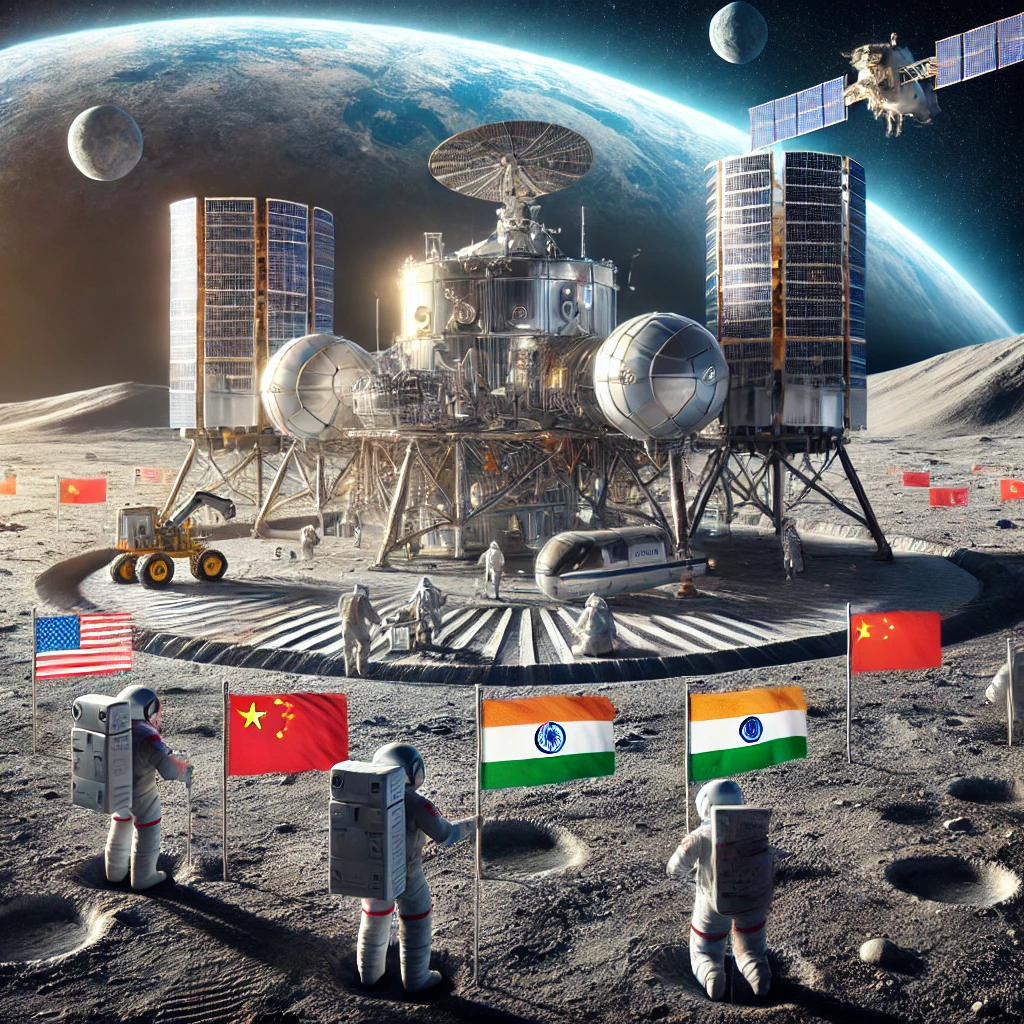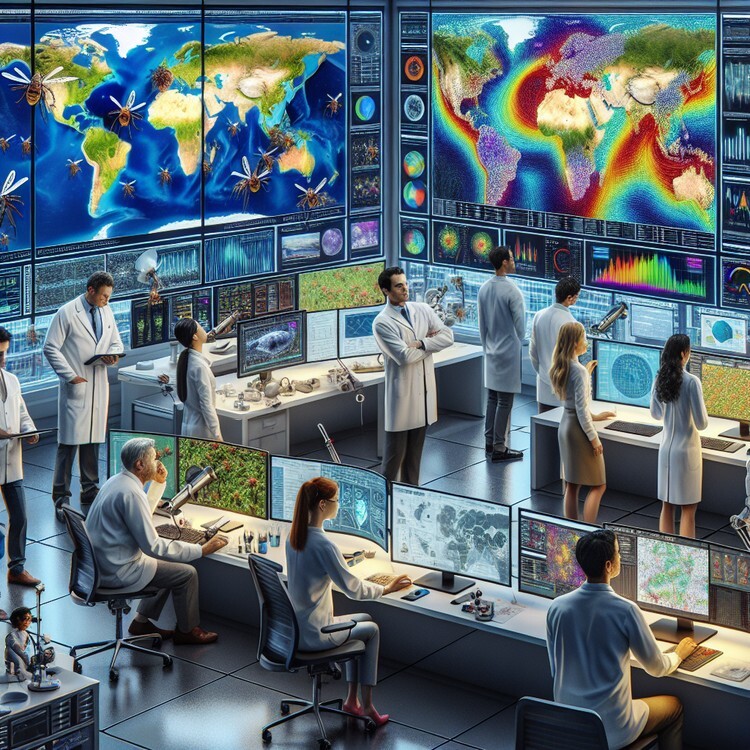The Moon has become a big deal lately because lots of countries and companies want to explore it and use its stuff. This has started a race to be the best in space. China, India, Japan, and the US have all landed spacecraft on the Moon. They’re even planning to build bases and send people there. But this race could cause problems because the laws about space exploration aren’t keeping up with all the progress.
In 1967, a treaty called the Outer Space Treaty said that no country can own the Moon. It belongs to everyone and should be explored for the benefit of all nations. But this treaty was made because people were scared that space would become a war zone during the Cold War. The current space race is different because it’s not just countries, but also private companies, trying to explore the Moon. This raises questions about how we should regulate using the Moon’s resources.
Even though countries are the main ones exploring the Moon, private companies are getting more involved. But these companies still need permission from a country to go to space, and that’s limited by international treaties. It’s a big deal to be one of the first to land on the Moon because it brings a lot of prestige and money. The Moon’s resources, like minerals and water, are really valuable. Water is especially important because we can use it for drinking, making oxygen, and fuel for rockets.
The US is trying to make new rules for exploring the Moon with the Artemis Accords. These rules say that we should follow the international treaties when using the Moon’s resources, but we might need some new rules too. More than 40 countries have agreed to these rules, but China hasn’t. Some people think the United Nations should make the new rules so that every country can be involved.
In the end, the Moon is becoming a place where lots of countries and companies want to go and use its resources. The laws we have now aren’t keeping up with all the progress, which is causing problems. We need new rules to make sure we use the Moon’s resources fairly and peacefully. The United Nations and international cooperation will be really important in deciding how we explore the Moon in the future.
Original news source: Who owns the Moon? A new space race means it could be up for grabs (BBC)
🎧 Listen:
Slow
Normal
Fast
📖 Vocabulary:
| 1 | explore | To travel around a place to learn about it |
| 2 | treaty | An agreement between countries |
| 3 | regulate | To control or manage something by making rules |
| 4 | prestige | Respect and admiration given to someone or something |
| 5 | minerals | Natural substances found in the earth |
| 6 | international | Involving more than one country |
| 7 | resources | Useful materials or supplies |
| 8 | cooperation | Working together with others |
| 9 | spacecraft | A vehicle designed for travel in space |
| 10 | permission | Approval to do something |
| 11 | valuable | Worth a lot of money or very useful |
| 12 | progress | Forward movement or improvement |
| 13 | regulate | To control or manage something by making rules |
| 14 | benefit | Something that helps or is good for someone |
| 15 | involved | Taking part in something |
Group or Classroom Activities
Warm-up Activities:
– News Summary
Instructions: Divide the class into small groups. Each group will read the article and then create a 1-2 minute news summary of the main points. They can choose one person to be the news anchor and others can be reporters. Each group will then present their news summary to the class.
– Opinion Poll
Instructions: In pairs, students will take turns asking each other questions related to the article. They can ask questions like “Do you think private companies should be allowed to explore the Moon?” or “Should the United Nations make new rules for using the Moon’s resources?” After asking the question, the student must give their own opinion and explain why.
– Sketch It
Instructions: Divide the class into pairs. One student will describe a scene or concept from the article while the other student tries to sketch it. They cannot show each other their work until the end. After the sketch is complete, they can compare and discuss their interpretations.
– Vocabulary Pictionary
Instructions: Write down key vocabulary words from the article on separate pieces of paper and put them in a hat or bowl. Divide the class into two teams. One student from each team will take turns picking a word and then drawing it on the board. Their team must guess the word within a certain time limit. The team with the most correct guesses wins.
– Future Predictions
Instructions: In pairs, students will discuss and make predictions about the future of space exploration and the use of the Moon’s resources. They can use phrases like “In the future, I think…” or “I predict that…” After discussing their predictions, they can share them with the class.
🤔 Comprehension Questions:
1. Why has the Moon become a big deal recently?
2. Which countries have landed spacecraft on the Moon?
3. What does the Outer Space Treaty say about owning the Moon?
4. Why were the laws about space exploration created in the first place?
5. Why is the current space race different from the one during the Cold War?
6. Why are private companies getting more involved in exploring the Moon?
7. Why is it a big deal to be one of the first to land on the Moon?
8. What are some of the valuable resources on the Moon and why are they important?
Go to answers ⇩
🎧✍️ Listen and Fill in the Gaps:
The Moon has become a big deal lately because lots of countries and companies want to explore it and use its stuff. This has started a race to be the best in space. China, India, Japan, and the US have all (1)______ spacecraft on the Moon. They’re even planning to build bases and send people there. But this race could cause problems because the laws about space exploration aren’t (2)______ up with all the progress.
In 1967, a (3)______ called the Outer Space Treaty said that no country can own the Moon. It (4)______ to everyone and should be explored for the (5)______ of all nations. But this treaty was made because people were scared that space would become a war zone during the Cold War. The current space race is different because it’s not just countries, but also private companies, (6)______ to explore the Moon. This raises questions about how we should regulate (7)______ the Moon’s resources.
Even though countries are the main ones exploring the Moon, private companies are getting more involved. But these companies still need permission from a country to go to space, and that’s (8)______ by international treaties. It’s a big deal to be one of the first to land on the Moon because it brings a lot of prestige and money. The Moon’s (9)______, like minerals and water, are really valuable. Water is especially important because we can use it for drinking, making (10)______, and fuel for rockets.
The US is trying to make new (11)______ for exploring the Moon with the (12)______ Accords. These rules say that we should follow the international treaties when using the Moon’s resources, but we might need some new rules too. More than 40 countries have agreed to these rules, but China hasn’t. Some people (13)______ the United Nations should make the new rules so that every (14)______ can be involved.
In the end, the Moon is becoming a place where lots of countries and companies want to go and use its resources. The laws we have now aren’t keeping up with all the progress, which is causing problems. We need new rules to make sure we use the Moon’s resources fairly and peacefully. The United Nations and (15)______ cooperation will be really important in deciding how we (16)______ the Moon in the future.
Go to answers ⇩
💬 Discussion Questions:
Students can ask a partner these questions, or discuss them as a group.
1. What do you think would be the benefits of exploring the Moon?
2. How would you feel if you had the opportunity to go to the Moon?
3. Do you think it’s fair that no country can own the Moon? Why or why not?
4. What do you think are some challenges that might arise from private companies exploring the Moon?
5. Do you think it’s important for the United Nations to make new rules for exploring the Moon? Why or why not?
6. What are some reasons why water is valuable on the Moon?
7. How do you think the Moon’s resources could be used to benefit all nations?
8. Do you think it’s necessary for countries to build bases on the Moon? Why or why not?
9. How do you think the Moon becoming a place for exploration will impact the future?
10. What are some potential conflicts that could arise from the race to explore the Moon?
11. How do you think international cooperation can help in deciding how we explore the Moon?
12. Do you think it’s fair that only countries and private companies are involved in exploring the Moon? Why or why not?
13. What do you think are some potential risks of exploring the Moon?
14. How do you think the Moon’s resources could be used to benefit life on Earth?
15. Do you think it’s possible for countries and companies to explore the Moon peacefully? Why or why not?
Individual Activities
📖💭 Vocabulary Meanings:
Match each word to its meaning.
Words:
1. explore
2. treaty
3. regulate
4. prestige
5. minerals
6. international
7. resources
8. cooperation
9. spacecraft
10. permission
11. valuable
12. progress
13. regulate
14. benefit
15. involved
Meanings:
(A) Something that helps or is good for someone
(B) Approval to do something
(C) Working together with others
(D) Respect and admiration given to someone or something
(E) To travel around a place to learn about it
(F) Useful materials or supplies
(G) To control or manage something by making rules
(H) Involving more than one country
(I) Taking part in something
(J) Forward movement or improvement
(K) Natural substances found in the earth
(L) To control or manage something by making rules
(M) Worth a lot of money or very useful
(N) A vehicle designed for travel in space
(O) An agreement between countries
Go to answers ⇩
🔡 Multiple Choice Questions:
1. Why has the Moon become a big deal lately?
(a) It has become a popular tourist destination.
(b) Many countries and companies want to explore it and use its resources.
(c) Scientists have discovered new life forms on the Moon.
(d) The Moon is disappearing and people want to study it before it’s gone.
2. Which of the following countries have landed spacecraft on the Moon?
(a) Russia, Germany, France, and Brazil
(b) Australia, Canada, Mexico, and Italy
(c) South Africa, Nigeria, Egypt, and Argentina
(d) China, India, Japan, and the US
3. What did the Outer Space Treaty of 1967 say about the ownership of the Moon?
(a) The Moon is owned by the country that lands on it first.
(b) No country can own the Moon, it belongs to everyone.
(c) The Moon is owned by the United States.
(d) The Moon is owned by the United Nations.
4. Why were the laws about space exploration made during the Cold War?
(a) To prevent space from becoming a war zone.
(b) To encourage more countries to explore space.
(c) To establish a space colony on the Moon.
(d) To compete with other countries in the space race.
5. Why are private companies getting more involved in exploring the Moon?
(a) They see it as a way to make money and gain prestige.
(b) They want to establish their own countries on the Moon.
(c) They are trying to prevent other countries from exploring the Moon.
(d) They are conducting scientific experiments on the Moon.
6. What resources on the Moon are considered valuable?
(a) Fossil fuels and metals
(b) Rare plants and animals
(c) Minerals and water
(d) Radioactive materials and gemstones
7. What are the Artemis Accords?
(a) A treaty that allows countries to own parts of the Moon
(b) A plan to establish a military base on the Moon
(c) New rules for exploring the Moon proposed by the US
(d) An agreement between countries to stop exploring the Moon
8. Who has not agreed to the Artemis Accords?
(a) India
(b) Japan
(c) Russia
(d) China
Go to answers ⇩
🕵️ True or False Questions:
1. The US has proposed new rules called the Artemis Accords for exploring the Moon, which have been agreed upon by more than 40 countries.
2. China, India, Japan, and the US have successfully landed spacecraft on the Moon.
3. There is a race among these countries and companies to be the best in space.
4. The United Nations and international cooperation will play a crucial role in determining the future of Moon exploration and resource usage.
5. Private companies are becoming less involved in Moon exploration, but they still need permission from a country to go to space.
6. A treaty called the Inner Space Treaty, made in 1967, states that no country can own the Moon.
7. The laws regarding space exploration are keeping up with the progress being made.
8. Several countries and companies are disinterested in exploring the Moon and utilizing its resources.
Go to answers ⇩
📝 Write a Summary:
Write a summary of this news article in two sentences.
Check your writing now with the best free AI for English writing!
Writing Questions:
Answer the following questions. Write as much as you can for each answer.
Check your answers with our free English writing assistant!
1. Why are countries and companies interested in exploring the Moon?
2. What does the Outer Space Treaty say about owning the Moon?
3. Why is the current space race different from the one during the Cold War?
4. Why are private companies getting more involved in exploring the Moon?
5. What are the Artemis Accords and why are they important for exploring the Moon?
✅ Answers
🤔✅ Comprehension Question Answers:
1. Why has the Moon become a big deal recently?
– The Moon has become a big deal because many countries and companies want to explore it and use its resources.
2. Which countries have landed spacecraft on the Moon?
– China, India, Japan, and the US have all landed spacecraft on the Moon.
3. What does the Outer Space Treaty say about owning the Moon?
– The Outer Space Treaty states that no country can own the Moon. It belongs to everyone and should be explored for the benefit of all nations.
4. Why were the laws about space exploration created in the first place?
– The laws about space exploration were created because people were scared that space would become a war zone during the Cold War.
5. Why is the current space race different from the one during the Cold War?
– The current space race is different because it involves not only countries, but also private companies. This raises questions about how to regulate the use of the Moon’s resources.
6. Why are private companies getting more involved in exploring the Moon?
– Private companies are getting more involved because they see the potential for prestige and money in being one of the first to land on the Moon. The Moon’s resources, such as minerals and water, are also valuable.
7. Why is it a big deal to be one of the first to land on the Moon?
– Being one of the first to land on the Moon brings a lot of prestige and money. It also allows access to valuable resources like minerals and water.
8. What are some of the valuable resources on the Moon and why are they important?
– Some valuable resources on the Moon include minerals and water. Water is especially important because it can be used for drinking, making oxygen, and fuel for rockets.
Go back to questions ⇧
🎧✍️✅ Listen and Fill in the Gaps Answers:
(1) landed
(2) keeping
(3) treaty
(4) belongs
(5) benefit
(6) trying
(7) using
(8) limited
(9) resources
(10) oxygen
(11) rules
(12) Artemis
(13) think
(14) country
(15) international
(16) explore
Go back to questions ⇧
📖💭✅ Vocabulary Meanings Answers:
1. explore
Answer: (E) To travel around a place to learn about it
2. treaty
Answer: (O) An agreement between countries
3. regulate
Answer: (G) To control or manage something by making rules
4. prestige
Answer: (D) Respect and admiration given to someone or something
5. minerals
Answer: (K) Natural substances found in the earth
6. international
Answer: (H) Involving more than one country
7. resources
Answer: (F) Useful materials or supplies
8. cooperation
Answer: (C) Working together with others
9. spacecraft
Answer: (N) A vehicle designed for travel in space
10. permission
Answer: (B) Approval to do something
11. valuable
Answer: (M) Worth a lot of money or very useful
12. progress
Answer: (J) Forward movement or improvement
13. regulate
Answer: (G) To control or manage something by making rules
14. benefit
Answer: (A) Something that helps or is good for someone
15. involved
Answer: (I) Taking part in something
Go back to questions ⇧
🔡✅ Multiple Choice Answers:
1. Why has the Moon become a big deal lately?
Answer: (b) Many countries and companies want to explore it and use its resources.
2. Which of the following countries have landed spacecraft on the Moon?
Answer: (d) China, India, Japan, and the US
3. What did the Outer Space Treaty of 1967 say about the ownership of the Moon?
Answer: (b) No country can own the Moon, it belongs to everyone.
4. Why were the laws about space exploration made during the Cold War?
Answer: (a) To prevent space from becoming a war zone.
5. Why are private companies getting more involved in exploring the Moon?
Answer: (a) They see it as a way to make money and gain prestige.
6. What resources on the Moon are considered valuable?
Answer: (c) Minerals and water
7. What are the Artemis Accords?
Answer: (c) New rules for exploring the Moon proposed by the US
8. Who has not agreed to the Artemis Accords?
Answer: (d) China
Go back to questions ⇧
🕵️✅ True or False Answers:
1. The US has proposed new rules called the Artemis Accords for exploring the Moon, which have been agreed upon by more than 40 countries. (Answer: True)
2. China, India, Japan, and the US have successfully landed spacecraft on the Moon. (Answer: True)
3. There is a race among these countries and companies to be the best in space. (Answer: True)
4. The United Nations and international cooperation will play a crucial role in determining the future of Moon exploration and resource usage. (Answer: True)
5. Private companies are becoming less involved in Moon exploration, but they still need permission from a country to go to space. (Answer: False)
6. A treaty called the Inner Space Treaty, made in 1967, states that no country can own the Moon. (Answer: False)
7. The laws regarding space exploration are keeping up with the progress being made. (Answer: False)
8. Several countries and companies are disinterested in exploring the Moon and utilizing its resources. (Answer: False)
Go back to questions ⇧















